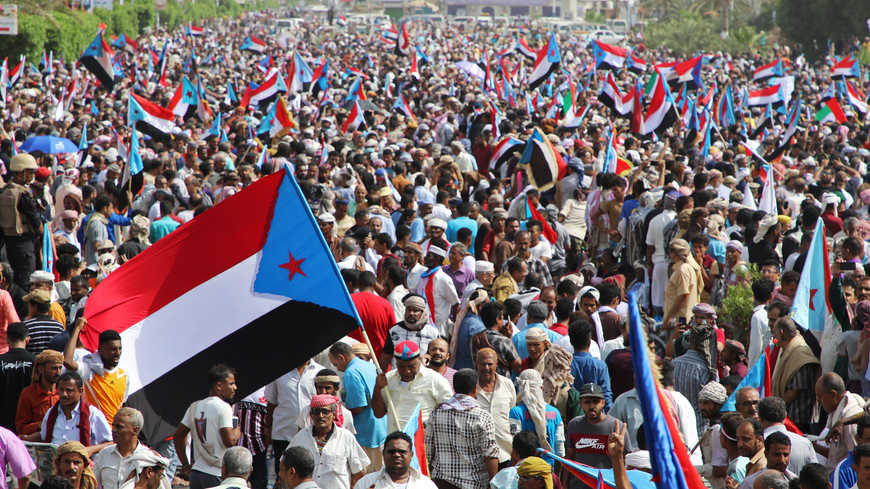
To complement these displays of strength and gain a favorable reception in Moscow, Houthi chief diplomat Mohammed Abdulsalam has publicly praised Russia’s collective security plan for the Persian Gulf. The Houthis also hope that Abdulsalam’s recent meeting with Ayatollah Ali Khamenei in Tehran will act as a gateway for normalized diplomacy on the world stage, and they positively view Russia’s frequent engagement with Iran on ending the war in Yemen. In spite of these positive signals, Houthi outreach efforts to Russia are unlikely to succeed unless the militant group suspends its destabilizing activities such as drone strikes on Saudi territory and efforts to sabotage oil shipments.
The STC believes that its swift triumph in Aden will convince Russia to back the creation of an independent south Yemeni state. When asked about the possibility of Russia supporting the STC’s participation in UN-backed peace negotiations, Ahmed bin Fareed, the STC’s chief diplomat in Europe, told Al-Monitor that “there is a new reality on the ground and the world has seen this reality.” Bin Fareed believes that the recent outpouring of popular support for the STC will force major world powers, like Russia, to stop ignoring southern Yemen’s demands.
Bin Fareed’s optimism is not unfounded, as STC leader Aidarous al-Zubaidi visited Moscow in March and Russian Ambassador to Yemen Vladimir Dedushkin has frequently highlighted the importance of resolving the question of southern Yemen’s status. Yet Russia has not publicly supported the STC’s inclusion in a peace settlement, as it is officially committed to Yemen’s unity and does not wish to be seen as an enabler of the UAE’s hegemonic aspirations on the Red Sea. Looking ahead, however, the stagnation of Yemen’s peace process could change Russia’s policy toward the STC. Former Russian ambassador to Saudi Arabia Andrei Baklanov told Al-Monitor that if warring parties in Yemen “do not exercise the proper degree of readiness to compromise,” Russia could allow southern Yemen to “establish its own government to bring peace to the people of the region.”
Although events in Aden could encourage Russia to establish closer relations with the Houthis and the STC, Moscow’s freedom of action is constrained by UN Security Council Resolution 2216. That resolution, which was adopted in April 2015, renders the Houthi occupation of Sanaa illegal and unequivocally supports a unified Yemen. Russia was the only country to abstain from voting on UNSC Resolution 2216, as it feared that the imposition of sanctions against the Houthis would escalate the conflict, but Moscow has not attempted to overhaul the resolution since it was implemented.
In spite of Russia’s public adherence to UNSC Resolution 2216, there are signs that Moscow could be willing to support the replacement of this resolution with a more inclusive framework. In February, Dedushkin implicitly criticized UNSC Resolution 2216 for allowing the use of force in Yemen and argued that the Houthis were unlikely to be dislodged from Sanaa through popular unrest. Baklanov said that resolving the Yemeni civil war is an “integral part” of Russia’s new collective security plan in the Persian Gulf. As Russia’s collective security vision hinges on the inclusion of all relevant stakeholders, Moscow could lobby for a peace settlement in Yemen that is more accommodating to the Houthis and the STC’s interests than current proposals.
Although Russia has treaded cautiously in the aftermath of the STC’s victory in Aden, the Houthis and the STC view Moscow as a potentially helpful partner in their efforts to gain international legitimacy. As divisions within the Saudi-led coalition sharpen and UNSC Resolution 2216 appears increasingly out-of-step with developments on the ground, Russia could step up its support for a more inclusive peace settlement in Yemen.
Samuel Ramani is a PhD candidate in international relations at St. Antony’s College, University of Oxford. He is also a journalist who contributes regularly to the Washington Post, Huffington Post, The Diplomat and the Russian International Affairs Council. On Twitter: @samramani2
©2019 Al-Monitor. All rights reserved.
TERMS OF USE
CONTACT US
STAY SOCIAL
ABOUT US
NEWSLETTERS
©2019 Al-Monitor, LLC. All rights reserved.
